Australian Tropical Rainforest Plants - Online edition
Pongamia pinnata var. minor (Benth.) Domin
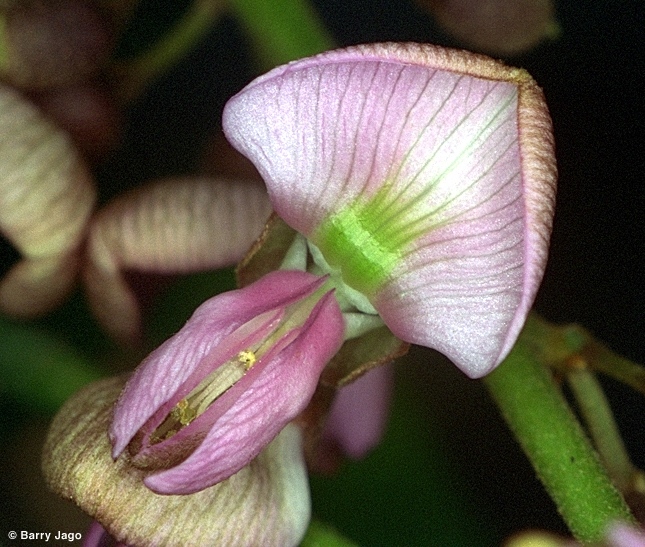
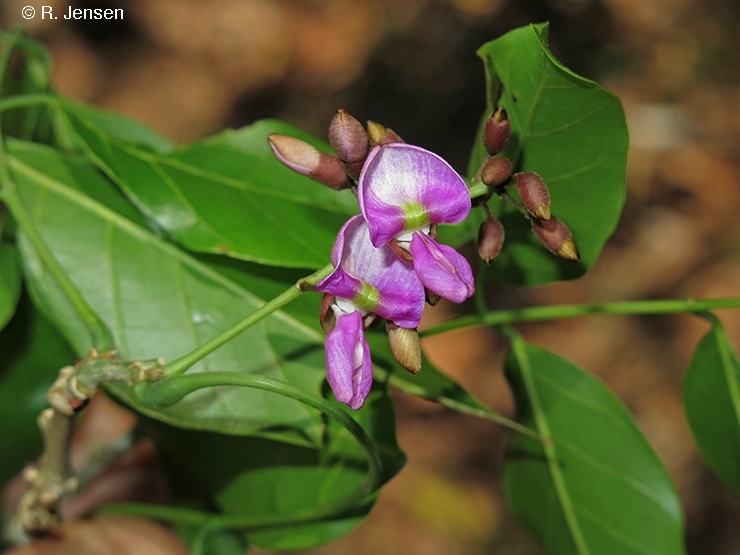
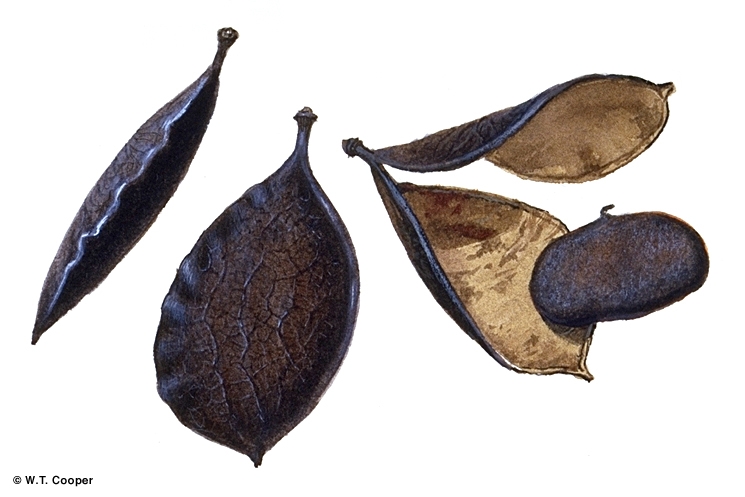
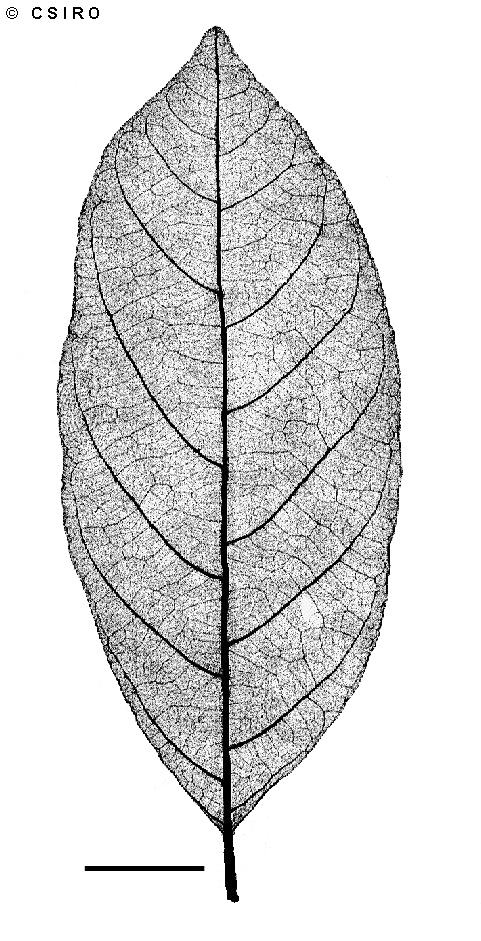

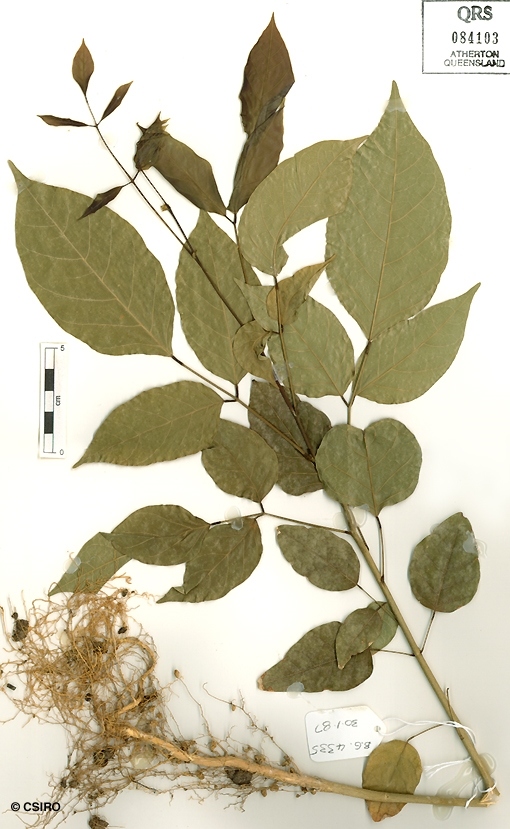
Domin, K. (1926) Bibliotheca Botanica 22(89): 787. Type: "Port Denison, s. dat., Fitzalan s.n. (lecto: MEL 2093476; probable isolecto: MEL 2093280, MEL 2093281, MEL 2093275, MEL 2093278, MEL 2093282, MEL 2093295, MEL 2093478) ...".
Tree up to 22 m, seasonally deciduous, diameter at breast height up to 42 cm; branches erect or often pendulous. Indumentum of pale fawn, golden or coppery hairs. Stipules oblong-falcate, oblique-obovate or oblique-spathulate, 5-6 mm long, 1.5-4 mm wide, abaxial hairs coppery hairs, apex obliquely acute or obtuse, margin ciliate with fawn hairs becoming glabrous. White granular stripes in the outer blaze. Orange coloured speckles often visible in the blaze.
Leaf rachis + petiole 65-220 mm; pulvinus at base 5-7 mm long; petiolules 5-9 mm long; leaflets 5-7 (rarely 5), ovate, elliptical, broadly elliptical, oblong, obovate or trullate; apex acuminate, shortly acuminate or acute; lateral leaflets 30-185 mm long, 13-80 mm wide; terminal leaflets 35-195 mm long, 16-97 mm wide, new growth red; secondary veins on basal leaflets 6-8 pairs, secondary veins on terminal leaflets 6-9 pairs at 40-60 degrees, raised on both surfaces.
Inflorescence up to ca. 80-flowered, a raceme or occasionally a few-branched panicle, 60–205 mm long; bracts triangular or lanceolate, 2.5-7mmlong, 1–1.5mmwide, pubescent,_at right angles to rachis and much longer than buds before dehiscing; pedicels 3-6 (rarely 8) mm long, puberulent with golden hairs; bracteoles ovate or triangular, 1-1.25 mm long, 0.3 mm wide. Flowers: calyx 3-4mm long, green or purplish-brown; standard broadly orbicular, 10-12.5 mm long (including claw 1.5-2 mm long) and 8-11 mm wide, bright pink with green nectar guides; wings oblong or oblong-ovate, 10-11 mm long (including claw 2-3mmlong) and ca. 3mmwide, bright pink; keel asymmetrically oblong, 9-10 mm long (including claw 3-4 mm long) and 3-3.5 mm wide, pink; filaments up to 9 mm long; anthers cordate, ca. 0.75 mm long and 0.5 mm wide, a few hairs at base; disc 0.3-0.5 mm high; ovary 5-6 mm long; stipe absent or ca. 0.25 mm long
Fruit pedicel 2.5-7 mm long; pod 39-62 x 15-26 x 7-10 mm, brown or blackish, glabrescent with sparse minute hairs near base, base attenuate, apex beaked, inner mesocarp wall papery, exocarp 1.5-2.5 mm thick; seeds reniform, rounded-reniform, laterally compressed, 11.5-16 x 10-18 x 3.5-12 mm, testa cream, pinkish-brown to brown, hilum diameter 1.5-3 mm
Cotyledons at or close to ground level, fleshy, without venation. First few pairs of leaves usually simple, cordate. At the tenth leaf stage: leaflets broadly ovate, apex acuminate, base obtuse, glabrous on the upper surface; leaflet stalks transversely wrinkled; petiole and rhachis of compound leaf glabrous; stipules hairy, about 3 mm long, oblong, somewhat falcate, apex rounded. Taproot somewhat swollen. Seed germination time 9 to 107 days.
Occurs in CYP, NEQ and CEQ. Altitudinal range from sea level to 500 m. Grows in a variety of habitats, e.g. monsoon forest, fringing forest along creeks, coastal vine thickets, sandstone escarpments, gallery forest, brackish estuaries and on the border of mangrove forest. Often found near permanent fresh water.
Pongamia sp. McIlwraith (B.Hyland 3295RFK), [Provisional phrase name]. Millettia sp. McIlwraith (B.Hyland 3295RFK), [Provisional phrase name]. Pongamia glabra var. minor Benth., Flora Australiensis 2: 273(1864), Lectotype: "Port Denison, s. dat., Fitzalan s.n. (lecto: MEL 2093476; probable isolecto: MEL 2093280, MEL 2093281, MEL 2093275, MEL 2093278, MEL 2093282, MEL 2093295, MEL 2093478) ...". Pongamia pinnata var. hannii Domin, Bibliotheca Botanica 22(89): 787 (1926), Lectotype: "Cape York Penin. Expedition. Comm. Queensland Government, Dec. 1873, W.Hann 274 (lecto: K 000618771) ...".





